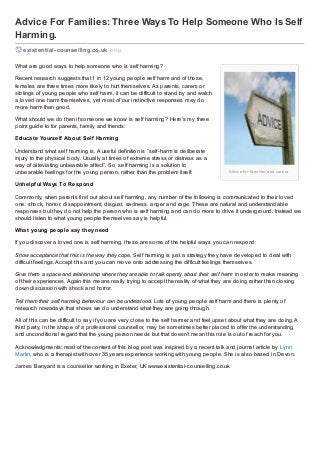
How to help people who self harm
- 1. Advice For Families: Three Ways To Help Someone Who Is Self Harming. existential-counselling.co.uk /blog What are good ways to help someone who is self harming? Recent research suggests that 1 in 12 young people self harm and of those, females are three times more likely to hurt themselves. As parents, carers or siblings of young people who self harm, it can be difficult to stand by and watch a loved one harm themselves, yet most of our instinctive responses may do more harm than good. What should we do then if someone we know is self harming? Here’s my three point guide to for parents, family and friends: Educat e Yourself About Self Harming Understand what self harming is. A useful definition is “self- harm is deliberate injury to the physical body. Usually at times of extreme stress or distress as a way of alleviating unbearable affect”. So, self harming is a solution to unbearable feelings for the young person, rather than the problem itself. Ad vi ce fo r fa m i l i e s a n d ca r e r s . Unhelpf ul Ways To Respond Commonly, when parents find out about self harming, any number of the following is communicated to their loved one: shock, horror, disappointment, disgust, sadness, anger and rage. These are natural and understandable responses but they do not help the person who is self harming and can do more to drive it underground. Instead we should listen to what young people themselves say is helpful. What young people say t hey need If you discover a loved one is self harming, these are some of the helpful ways you can respond: Show acceptance that this is the way they cope. Self harming is just a strategy they have developed to deal with difficult feelings. Accept this and you can move onto addressing the difficult feelings themselves. Give them a space and relationship where they are able to talk openly about their self harm in order to make meaning of their experiences. Again this means really trying to accept the reality of what they are doing rather than closing down discussion with shock and horror. Tell them their self harming behaviour can be understood. Lots of young people self harm and there is plenty of research nowadays that shows we do understand what they are going through. All of this can be difficult to say if you are very close to the self harmer and feel upset about what they are doing. A third party, in the shape of a professional counsellor, may be sometimes better placed to offer the understanding and unconditional regard that the young person needs but that doesn’t mean this role is out of reach for you. Acknowledgments: most of the content of this blog post was inspired by a recent talk and journal article by Lynn Martin, who is a therapist with over 35 years experience working with young people. She is also based in Devon. James Banyard is a counsellor working in Exeter, UK www.existential- counselling.co.uk
